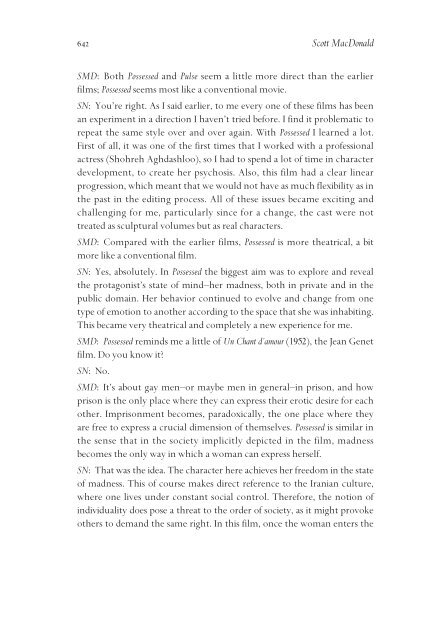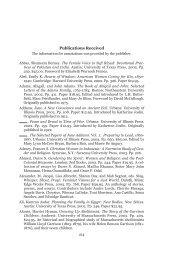An Interview with Shirin Neshat - Feminist Studies
An Interview with Shirin Neshat - Feminist Studies
An Interview with Shirin Neshat - Feminist Studies
You also want an ePaper? Increase the reach of your titles
YUMPU automatically turns print PDFs into web optimized ePapers that Google loves.
642 Scott MacDonald<br />
SMD: Both Possessed and Pulse seem a little more direct than the earlier<br />
films; Possessed seems most like a conventional movie.<br />
SN: You’re right. As I said earlier, to me every one of these films has been<br />
an experiment in a direction I haven’t tried before. I find it problematic to<br />
repeat the same style over and over again. With Possessed I learned a lot.<br />
First of all, it was one of the first times that I worked <strong>with</strong> a professional<br />
actress (Shohreh Aghdashloo), so I had to spend a lot of time in character<br />
development, to create her psychosis. Also, this film had a clear linear<br />
progression, which meant that we would not have as much flexibility as in<br />
the past in the editing process. All of these issues became exciting and<br />
challenging for me, particularly since for a change, the cast were not<br />
treated as sculptural volumes but as real characters.<br />
SMD: Compared <strong>with</strong> the earlier films, Possessed is more theatrical, a bit<br />
more like a conventional film.<br />
SN: Yes, absolutely. In Possessed the biggest aim was to explore and reveal<br />
the protagonist’s state of mind–her madness, both in private and in the<br />
public domain. Her behavior continued to evolve and change from one<br />
type of emotion to another according to the space that she was inhabiting.<br />
This became very theatrical and completely a new experience for me.<br />
SMD: Possessed reminds me a little of Un Chant d’amour (1952), the Jean Genet<br />
film. Do you know it?<br />
SN: No.<br />
SMD: It’s about gay men–or maybe men in general–in prison, and how<br />
prison is the only place where they can express their erotic desire for each<br />
other. Imprisonment becomes, paradoxically, the one place where they<br />
are free to express a crucial dimension of themselves. Possessed is similar in<br />
the sense that in the society implicitly depicted in the film, madness<br />
becomes the only way in which a woman can express herself.<br />
SN: That was the idea. The character here achieves her freedom in the state<br />
of madness. This of course makes direct reference to the Iranian culture,<br />
where one lives under constant social control. Therefore, the notion of<br />
individuality does pose a threat to the order of society, as it might provoke<br />
others to demand the same right. In this film, once the woman enters the




